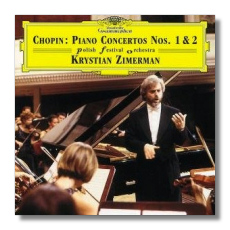
The Internet's Premier Classical Music Source
Related Links
- Chopin Reviews
- Latest Reviews
- More Reviews
-
By Composer
-
Collections
DVD & Blu-ray
Books
Concert Reviews
Articles/Interviews
Software
Audio
Search Amazon
Recommended Links
Site News
 CD Review
CD Review
Frédéric Chopin

Piano Concertos
- Piano Concerto #1 in E minor, Op. 11 (1830)
- Piano Concerto #2 in F minor, Op. 21 (1830)
Krystian Zimerman, piano
Polish Festival Orchestra/Krystian Zimerman
Deutsche Grammophon 459684-2 DDD 2CDs 45:48, 35:51
It may same odd to focus on the orchestra when discussing a new recording of Chopin's piano concertos, given the "bad press" that the composer's orchestral writing has received in the past 170 years or so. It is true that Chopin's genius lay in what he did with the piano and not in with other instruments. Nevertheless, he was competent and, at times, more than that when he wrote the orchestral parts to these concertos. Also, it should be remembered that they are the work of a man who was only around 20, so allowances should be made for inexperience as well.
To mark the 150th year since Chopin's death, Polish pianist Krystian Zimerman decided to form an orchestra whose function would be to perform these concertos with him on tour. He heard hundreds of applicants before deciding on about 60 – a smallish group, but perfectly appropriate for the music. Zimerman has controlled every detail of the members' professional lives together, even down to which kind of bus they will ride, what videos they will see, and what they will eat. (And you thought Herbert von Karajan was into control!) Based on this recording, made in Turin last August, it's all been worth it.
Zimerman is not a stranger to conducting from the keyboard. Several years ago, when he and Leonard Bernstein were recording Beethoven's five piano concertos, the conductor's relatively sudden death left the first two concertos untouched. Following Beethoven's example, Zimerman decided that he could be the conductor as well as the soloist, and the results were a success, as they are here.
It is no surprise, then, that the orchestral playing here benefits from uncommon care and preparation. Zimerman shapes every phrase and refines every sonority, and while he is highly attentive, he doesn't seem merely fussy. He doesn't try to make the orchestral writing into something it's not, but he does make sure that it lives up to its full potential.
He's hardly ignored his pianism. When he recorded this music with Carlo Maria Giulini nearly 25 years ago, he was still a young man, but already highly masterful. He is no less impressive here. As always, his Chopin is noble, passionate but not febrile, and responsive to every shifting mood. His tone and legato playing are ravishing, and his execution of the composer's florid runs and other figurations is smooth. When Chopin visited Scotland near the end of his life, he was annoyed by the women who always said that his playing was "like water," but it's a good analogy for Zimerman's pianism. Like water, it sparkles, but it also forms clear, still pools and violent torrents. The difference between the two is that water's motions are chaotic, while Zimerman's are beautifully ordered.
I received a pre-release copy of this set from Universal Classics, so I can't comment on the packaging. The sound is warm but not otherwise remarkable. Given the shortness of the two discs, I am hoping that DG is offering them for the price of one. Even if this is not the case, though, these recordings are definitely in the front of the pack, and should be heard by everyone to whom this music matters.
Copyright © 2000, Raymond Tuttle


















